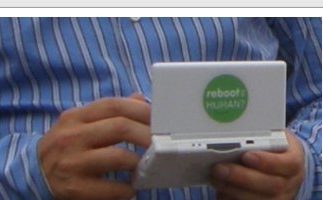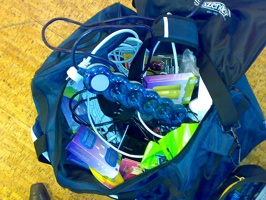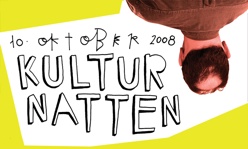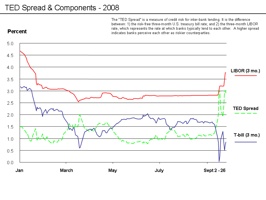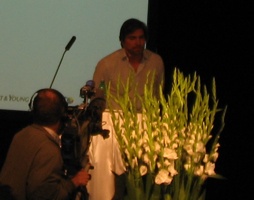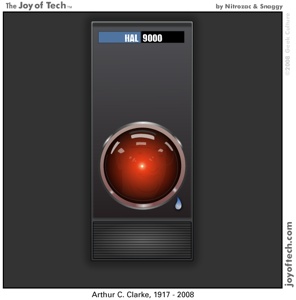 March the 24th 2009 is Ada Lovelace Day, the brainchild of Suw Charman-Anderson. Suw pledged to write a blog-post about a woman in tech that she admired, if at least 1,000 would make the same pledge, and since I’ve admired and been fascinated by Ada Lovelace since childhood, and especially after I read the wonderful book The Difference Engine, so I embraced the project, but at the same time I knew that it would be difficult for me to find just a woman in tech that I admire, that is because the list is long, and I’m happy to say that it’s actually getting longer.
March the 24th 2009 is Ada Lovelace Day, the brainchild of Suw Charman-Anderson. Suw pledged to write a blog-post about a woman in tech that she admired, if at least 1,000 would make the same pledge, and since I’ve admired and been fascinated by Ada Lovelace since childhood, and especially after I read the wonderful book The Difference Engine, so I embraced the project, but at the same time I knew that it would be difficult for me to find just a woman in tech that I admire, that is because the list is long, and I’m happy to say that it’s actually getting longer.
In the end it turned out to be quite simple to name one single woman in “tech” that I admire, a woman that I’ve admired for 2,5 years since I met her at the wonderful BlogForum 2 – an initiative that we really need to revive – and almost did at Copenhagen Twitterfestival.
Since 2006 the woman I have in mind has become quite the celebrity, due to her uncompromising and relentless pursuit of the truth in the murky waters of the Danish tech-business, and this year she’s the natural selection, she’s the woman behind the mainstream breakthrough of the blog-media in Denmark, she is – of course – Bizzen/Toften: the journalist and blogger par excellence Dorte Toft.
Love/hate relationship with “tech”
I have a love/hate relationship with my field, the field known as “tech”. Tech is definitely one of the places where change is happening today, and I feel blessed that I’m involved in bringing this change.
But “Tech” is a field that is riddled by paradox. On one hand it’s crawling with greedy snake-oil salesmen, on the other it’s home to the most revolutionary, idealistic and altruistic people ever as well as some of the most wonderful concepts that humankind has ever come up with.
The problem with the snake-oil salesmen, is that, until now, they’ve pretty much got away with cheating their customers, the authorities, the business community and worst, their employees, and a lot of the snake-oil has been sold under the heading that Denmark is number one in tech.
It’s been a constant embarrassment to me, and I actually left the business four years ago, and it took me two years of “repenting” before I felt that could return to “tech”, and today I’m luckily to be employed by a tech-company that doesn’t carry any snake-oil.
Emperor’s new clothes
I’m just going to, briefly, mention the fact that Dorte Toft was the woman that noticed that Stein Bagger and IT Factory didn’t wear any clothes, thus exposing one of the biggest scams the Danish tech-sector has seen to date, but thank you Dorte for exposing these people, so that we can be protected against these predators and making it possible to feel proud about working in “tech” again.
Feminism isn’t “low-status”
What I’d rather celebrate today is that Dorte Toft is a self-proclaimed feminist, even though it’s – in her own words – a field that is “low-status”, and her labour of love “Nærmest Lykkelig I Nørdland” (“Almost happy in Geekland” – something got lost in translation sorry about that), where Dorte Toft has been writing and writing and writing about the benefits young women would have if the choose to join the so-called “though” fields, technology and science, a very noble cause.
I noticed that Dorte Toft also wrote a blog-post in observation of Ada Lovelace Day today. In this blog-post Dorte is pledging to return to “Nærmest Lykkelig I Nørdland”, I’m so, so happy to hear that, Dorte Toft has been toiling away, trying to ease young women into the fields of tech and science, and her work deserves so much more attention than the perpetual Stein Bagger saga.
To all the wonderful women that I’ve worked with, am working with and will work with in the future, thank you so, so much for putting up with us, we need you, and remember how far you’ve come.
When I mentioned to my father how much I loved having female managers, he simply said that he could never ever imagine have a female manager, I was appalled.
Women, “tech” is too important to be left to men
Women please don’t stop now, so that next time I’m in a position where I’m hiring tech-staff, I hope that I’ll receive applications from women. Looking at the number of students at the IT University in Copenhagen I’m quite optimistic that that would be the case.
DORTE TOFT: Please go work on “Nærmest Lykkelig I Nørdland”, I’m waiting for it, unlike the book about “Banditterne i habitterne” (“The Bandits In Suits”) – and remember feminism isn’t “low-status”!
YOUNG WOMEN: We really, really need you in the tech-sector. Tech is far too important to leave to us men, and listen to, and get inspired by Dorte Toft!
Celebrating the Enchantress of Numbers
I’ll close this post with these wonderful quotes.
We may see aptly that the Analytical Engine weaves algebraic patterns just as the Jacquard loom weaves flowers and leaves
Lady Ada Lovelace
Forget this world and all its troubles and if possible its multitudinous Charlatans – everything in short but the Enchantress of Numbers
Charles Babagge, inventor of the Analytical and Difference engines
Notes
If you want to learn more about the fascinating life of Ada Lovelace, daughter of Lord Byron, by many considered the inventor of programming languages, I’d strongly recommend “The Bride of Science: Romance, Reason, and Byron’s Daughter“, “Zeroes and Ones: Digital Women and the New Technoculture” and “The Difference Engine“.
I’m also building a “shrine” to Ada Lovelace on Algorim.dk, a result of “mellemrumssingulariteten” which was inspired by a young woman I know, this woman is, BTW., working in the purest field of them all 😉
